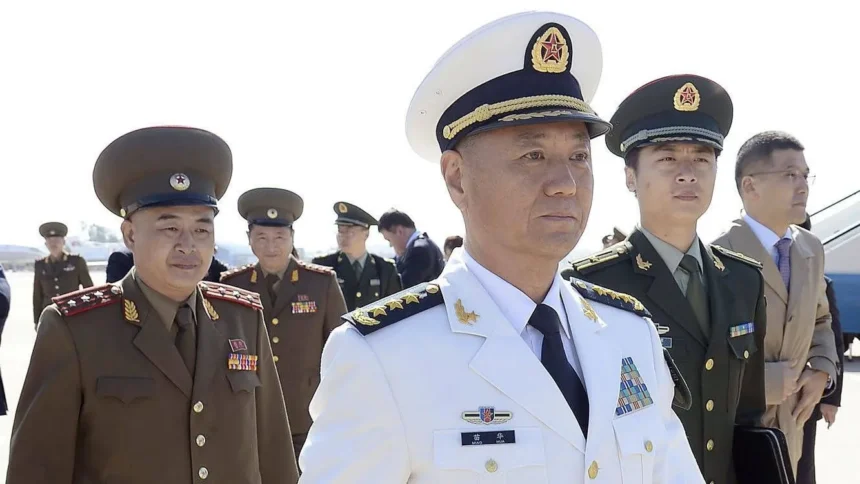BEIJING — President Xi Jinping has tightened his control over China’s armed forces, removing General Miao Hua from the Central Military Commission (CMC). The official announcement, relayed by state news agency Xinhua on June 27, 2025, highlights Xi’s ongoing anti-corruption campaign within the military, though many see these actions as moves to cement his authority as much as to address graft.
Miao’s dismissal, alongside the sudden disappearance of another leading general, He Weidong, points to a broader purge shaking up China’s military ranks and hinting at growing uncertainty inside Xi’s trusted circles.
The CMC sits at the top of China’s military structure. Chaired by Xi, it oversees the People’s Liberation Army, including the navy, air force, and the strategic rocket division. Unlike in other countries where the defence ministry may lead, in China, real power rests with the CMC, which the Communist Party controls directly.
The commission consists of a select group of high-ranking officers hand-picked for their loyalty. Xi uses this power base to keep the armed forces close to the Party and, most importantly, to himself, promoting those he trusts and replacing those he feels might waver in their loyalty.
General Miao Hua, 69, held a senior post in the CMC as director of its Political Work Department. He was responsible for maintaining ideological discipline in the military, making sure loyalty to the Party never slipped. After Xi took the country’s top job in 2012, Miao’s career took off, eventually becoming one of the highest-ranking admirals.
His sudden removal, following a probe for “serious violations of discipline” (usually a sign of corruption charges), makes him the eighth CMC member replaced since Xi came to power—something not seen since the Mao era.
Xi’s Purge Driven by Control and Distrust
Xi’s anti-corruption drive, launched soon after he became leader, has re-shaped the Communist Party. He has targeted high-ranking officials as well as lower-level bureaucrats. In the armed forces, the crackdown has already led to the downfall of scores of top generals, including two past defence ministers and leaders in the Rocket Force, responsible for China’s nuclear missiles.
The US Pentagon noted in 2024 that these purges may have slowed China’s goals to modernise its military—a priority for Beijing as it seeks to match US power by 2027.
Many observers say the scale of these purges points to motives that go beyond stopping corruption. Xi appears keen to remove anyone who could challenge him and to keep the military tightly under his control. Miao’s removal is striking since he shares old provincial ties with Xi from their Fujian days, showing that even those closest to the president are not immune.
General He Weidong, second-in-command at the CMC and another Xi ally, has not been seen in public since March 2025. Rumours of an investigation have fuelled talk that he might be next. If confirmed, his fall would be the biggest military shake-up since the removal of General Zhao Ziyang after the Tiananmen protests in 1989.
Xi’s Grip and the Rise of Loyalists
Xi Jinping’s hold over China has grown stronger year by year. By scrapping presidential term limits in 2018, he set himself up to stay in power indefinitely, holding the titles of Party head, President, and CMC leader.
This concentration of roles gives him unmatched control of the country’s political, military, and state machinery. But this also means that the few who remain close to him tend to tell him only what he wants to hear.
This atmosphere has led to a mood of caution, even fear, among China’s generals and high-ranking officials. Many worry about being targeted, so open criticism is rare, especially when it comes to military readiness or internal problems.
The Rocket Force, for example, has been hit by corruption scandals and doubts over equipment purchases, but these problems are seldom raised openly. As one retired PLA officer, speaking without giving his name, put it, “Telling Xi the truth can cost you everything. Only loyalty counts now.”
Xi’s drive to control the military may have left him more isolated than ever. With trusted allies like Miao removed and He Weidong possibly under investigation, his inner circle is shrinking. Some analysts suggest these moves reflect growing rifts within the Communist Party as different factions push for influence.
Tang Jingyuan, a US-based China expert, has suggested to the Guardian that General Zhang Youxia, another high-ranking CMC official, might be playing a role in the current shake-ups to strengthen his position, which could weaken Xi’s standing over time.
Despite these signs of tension, Xi’s control stays strong for now. The Central Military Commission, once made up of seven members, now has just four, with empty seats at the top. Constant changes at the highest level of command have added to the uncertainty about whether the military can meet the ambitious targets Xi has set.
As China gets ready for Army Day on August 1, many are watching to see if Xi will fill the CMC’s vacant posts or continue the purge. Loyalty to the Communist Party—and Xi personally—remains the top priority, but this focus on loyalty risks damaging morale throughout the ranks. For most Chinese citizens, these leadership changes seem distant, with state media giving little coverage. Inside the capital, though, the message is clear: Xi’s demand for loyalty leaves no safe space, even for his closest allies.
Inside the Party’s guarded halls, where doubts are silenced by calls for unity, Xi’s campaign continues to change the shape of China’s military and political future. Only time will tell if this approach strengthens his rule or creates new cracks in the system.
Sources: Bloomberg, The Guardian














